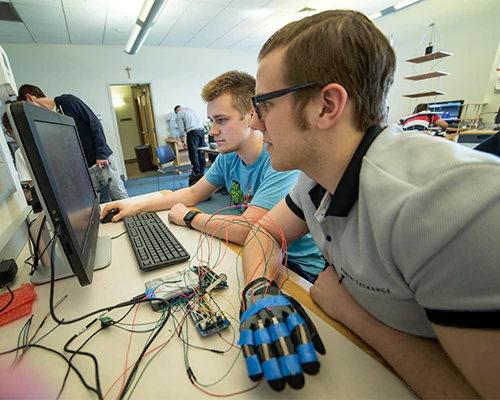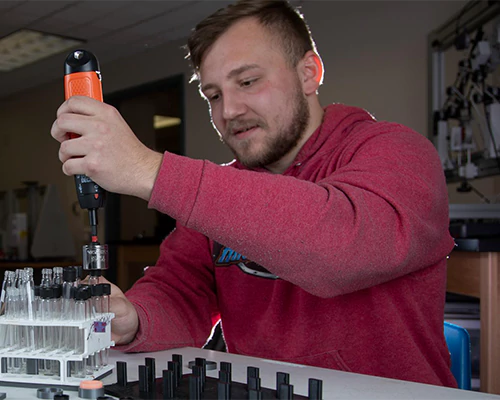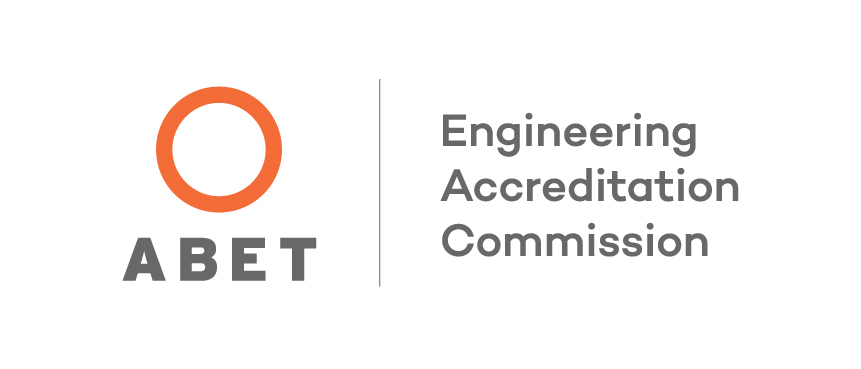What makes our Mechanical Engineering program different?
You'll use creative design throughout your time at King's, from your first semester all the way to your final capstone project when you build a machine for an actual client. You could come up with a device that factory workers use to move heavy metals, a machine that controls flow for manufacturing particles, or even build a robot that uses ultrasound to navigate autonomously.
This experience is possible because our faculty work closely with students in small classes. We'll help you match your talents and passions with exciting opportunities in the real world. Our mechanical engineering curriculum is driven by the insights of our partners in industry, who know the importance of creativity, practical thinking, and professional skills like teamwork and communication.


Most of your mechanical engineering courses include hands-on experience. You'll solve complex, open-ended problems using the same tools that engineers use on the job, including CAD and simulation software, codes and standards, rapid prototyping, and machining equipment.
The King's College Bachelor of Science in Mechanical Engineering program is accredited by the Engineering Accreditation Commission of ABET. Our mechanical engineering curriculum is taught at the brand-new, state-of-the-art Mulligan Center for Engineering in Wilkes-Barre, Pennsylvania, which houses four large multi-use classrooms, student study areas, faculty offices, and five fully equipped engineering laboratories.

What can you do with a mechanical engineering degree?
Mechanical engineers design machines that help people. From the steam engines that powered the industrial revolution to the steam turbines that generate most of the electricity in the United States. We make better use of energy by designing more efficient tools, buildings, and vehicles.
We design hip implants for the elderly, toys for kids, and kitchen utensils for people with disabilities. We design and power machines that manufacture millions of products around the world. Whether it's surgery, cleaning, manufacturing, or space exploration, mechanical engineers design machines in just about every industry.
What's great about mechanical engineering career opportunities?
A Bachelor of Science in Mechanical Engineering leads to high career satisfaction because you will use your creativity to help people. Because mechanical engineering is the broadest engineering discipline, we have options for career growth in technical specialization, management, and entrepreneurship.
Graduates with a mechanical engineering degree work in a wide range of industries including aerospace, medical devices, electrical power, manufacturing, transportation, HVAC, and robotics. Our flexibility and the constantly changing nature of technology keep our jobs interesting and makes us attractive hires even in slow market conditions. Many mechanical engineering degree jobs have a family-friendly combination of salary and working hours. As of 2021, mechanical engineers earn an average annual salary of $95,300.
Mechanical Engineering Degree Requirements
View a comprehensive list of mechanical engineering education requirements here.
Mathematics and Science (34 credits)
- CHEM 113/L General Chemistry I with Lab
- CHEM 114/L General Chemistry II with Lab
- PHYS 113/L Physics for Scientists and Engineers I with Lab
- PHYS 114/L Physics for Scientists and Engineers II withLab
- MATH 129 Analytic Geometry/Calculus I
- MATH 130 Analytic Geometry/Calculus II
- MATH 231 Analytic Geometry/Calculus III
- MATH 237 Mathematical Methods for the Physical Sciences
- MATH 238 Differential Equations
General Engineering Curriculum (24.5 credits)
- CS 111/L Programming for Science and Engineering with Lab
- ENGR 150 Engineering Seminar
- ENGR 250/L System Design and Analysis with Lab
- PHYS 241 Statics
- PHYS 242 Mechanics of Solids
- ENGR 350/L Engineering Materials with Lab
- ENGR 360 Probability and Engineering Statistics
Mechanical Engineering Major Sequence Requirements (41 credits)
- ME 200/L Introduction to Mechanical Engineering with Lab
- ME 250 Thermodynamics
- ME 320/L Manufacturing Systems with Lab
- ME 340/L Dynamics
- ME 350/L Fluid Mechanics with Lab
- ME 360/L Heat Transfer with Lab
- ME 380/L Mechatronics with Lab
- ME 400/L Mechanical Design with Lab
- ME 410 Special Topics in Mechanical Engineering
- ME 420/L System Dynamics with Lab
- ME 441/L Capstone Design I with Lab
- ME 442/L Capstone Design I with Lab
Mechanical Engineering Courses
Our mechanical engineering major follows a pattern of successive building and bolstering of disciplinary knowledge and transferable skills, per the program goals for learning and student outcomes.
View a comprehensive list of all mechanical engineering degree requirements here.
ME 200/L Introduction to Mechanical Engineering with Lab
A broad introductory course in which students use the conceptual design process to explore what mechanical engineers do and why it matters. Strategies for using information in the design process. Legal, ethical, and social considerations that arise in mechanical engineering practice. Prerequisite: ENGR 150. 3 Lecture Hours per week and 3 Laboratory Hours every two weeks.
ME 250 Thermodynamics
Introduces application of conservation laws to thermo-fluid systems. Properties, energy, entropy, efficiency, and psychometrics. Applications such as power plants, engines, refrigerators, heat pumps, and air conditioning systems. Prerequisite: MATH 130. 3 Lecture Hours.
ME 320/L Manufacturing Systems with Lab
This course explores the technology behind different types of manufacturing operations, and the proper application of processes and techniques to transform raw materials into components, and components into assemblies. This course focuses on the methods used in the manufacturing and processing of metals, plastics, and composites: material removal, hot and cold forming, casting, and molding, heat treatment, joining and welding, and finishing processes. Prerequisite: ENGR 350/L. 3 Lecture Hours and 3 Laboratory Hours.
ME 340 Dynamics
This course explores kinematic analysis of rigid bodies in 2D and 3D motion. Relative linear and angular motion. Force, energy, and momentum applied to particles, rigid bodies and mechanisms. Free and forced vibrations of mechanical systems. Prerequisite: PHYS 113/L, PHYS 241. 3 Lecture Hours.
ME 350 Fluid Mechanics with Lab
Topics to be covered include fluid properties, design and analysis of experiments, scaling analysis, Bernoulli's equation, Reynolds Transport Theorem, and the Navier-Stokes equations. Applications such as pipe flow, boundary layers, turbulence, turbomachines, and compressible flow. Prerequisite: PHYS 241, MATH 231, and MATH 238. 3 Lecture Hours per week and 3 Laboratory Hours every two weeks.
ME 360/L Heat Transfer with Lab
This course explores the transmission of heat via conduction, convection, radiation, thermal resistance, heat exchangers, and boiling and condensation. This course applies thermodynamics, fluid mechanics, and heat transfer to design energy systems. Prerequisite: CS 111/L, ME 350/L, ME 250. 3 Lecture Hours and 3 Laboratory Hours.
ME 380/L Mechatronics with Lab
An introductory course that focuses on the development of integrated mechanical systems which transduce sensor inputs into signals, transform signals using circuits, and output signals to actuators for mechanical systems. Sensor response and uncertainty, analog and digital circuits, and analysis and operation of actuators such as electric motors, solenoids, and hydraulic and pneumatic cylinders. Selection of sensors, circuits, and actuators to meet design specifications. Prerequisite: CS 111/L, MATH 238, PHYS 114/L, ENGR 250/L. 3 Lecture Hours and 3 Laboratory Hours.
ME 400/L Mechanical Design with Lab
Introduces students to fundamental concepts and considerations when designing mechanical systems. Topics to be covered include stress analysis of machine elements, failure theories and analysis, deformation and stiffness. Students will design components using CAD. Prerequisite: PHYS 242, and ME 340; Co-requisite ENGR 350/L. 3 Lecture Hours and 3 Laboratory Hours.
ME 410 Special Topics in Mechanical Engineering
This is a mechanical engineering elective course. Students are required to take ME 410 in either the Fall or Spring semester of their senior year. Topics will vary based on faculty and student interests. Potential topics for this course may include Biomedical Engineering, Energy Systems, Process Design and Control, and Mathematical Modeling. Prerequisites: Senior Status or permission of instructor. 3 Lecture Hours.
ME 420/L System Dynamics with Lab
This course focuses on how systems behave over time, how to determine the characteristics of system behavior, and how to use mathematical analysis to make design choices about systems. Students will analyze mechanical, electrical, and fluid systems, as well as systems that are combined from these domains, such as electric, hydraulic, and pneumatic actuators. Students will use Laplace-domain representations to solve differential equations to find the response of systems over time, determine the response to periodic inputs at different frequencies, and design control systems such as proportional-integral-derivative. Prerequisite: ME 340, ME 380/L, and Senior Status. 3 Lecture Hours and 3 Laboratory Hours.
ME 441/L Capstone Design I with Lab
This course focuses on the design of mechanical or thermo-fluid systems. Teams of students begin a year-long design project. Identification of opportunities, development of requirements, analysis and synthesis, generation of multiple solutions, standards. Prerequisite: Senior Status. 3 Lecture Hours and 3 Laboratory Hours.
ME 442/L Capstone Design II with Lab
This course focuses on the design of mechanical or thermo-fluid systems. Teams of students complete a year-long design project. Detail design, prototyping, testing, design refinement, evaluation of solutions against requirements. Prerequisite: ME 441/L. 3 Lecture Hours and 3 Laboratory Hours.
Mechanical Engineering Degree Objectives
Within a few years of graduation, King's students with a mechanical engineering major are expected to:
- Complete engineering projects by using technical knowledge, working independently and as a member of a team, taking responsibility, communicating, and demonstrating leadership.
- Recognize how their responsibilities fit into their organization and take initiative to support the broader organization.
- Grow professionally and engage in life-long learning by completing graduate degrees or pursuing other training, obtaining licensure or certifications, and receiving guidance from mentors.
- Act as citizen-engineers by living and working ethically with concern for society and the environment.
Mechanical Engineering Degree Student Outcomes
King's College mechanical engineering graduates should be able to:
- Identify, formulate, and solve complex engineering problems by applying principles of engineering, science, and mathematics.
- Apply engineering design to produce solutions that meet specified needs with consideration of public health, safety, and welfare, as well as global, cultural, social, environmental, and economic factors.
- Communicate effectively with a range of audiences.
- Recognize ethical and professional responsibilities in engineering situations and make informed judgments, which must consider the impact of engineering solutions in global, economic, environmental, and societal contexts.
- Function effectively on a team by providing leadership, creating a collaborative and inclusive environment, establishing goals, planning tasks, and meeting objectives.
- Develop and conduct appropriate experimentation, analyze, and interpret data, and use engineering judgment to draw conclusions.
- Acquire and apply new knowledge as needed, using appropriate learning strategies.
King's College Engineering Faculty
- Dr. Paul Lamore
- Chairperson, Engineering Department
- Professor of Engineering and Business & Management
- paullamore@kings.edu
Read Bio
Dr. Paul R. Lamore is a Professor of Engineering and Business & Management, and chairperson of the Engineering Department. He started teaching at King's College in 2005 and taught for four years at Providence College prior to joining King's. He has 20 years of industry experience, including electrical engineering and engineering management positions at Knolls Atomic Power Laboratory, Brown & Sharp, and Texas Instruments. He spent 10 years at Sharplan/Surgilase, designing and developing new applications for medical lasers. His responsibilities also included supply chain and operations management, as well as technical marketing and product line management. His research interests include innovation management and new product development. He received his Ph.D. in Industrial and Systems Engineering, with a concentration in Engineering Management, from the University of Alabama in Huntsville. He holds a M.B.A. from Providence College, a M.S. in Electrical Engineering from Union College, a B.S. in Electrical Engineering from Washington University in St. Louis, and a B.S. in Physics from Providence College.
- Dr. Ismail Haltas
- Associate Professor of Civil Engineering
- ismailhaltas@kings.edu
Read Bio
Ismail Haltas, Assistant Professor of Civil Engineering, graduated from Middle East Technical University Ankara with a B.S. .in Civil Engineering. He graduated from the University of California, Davis with M.S. and Ph.D. degrees in Civil and Environmental Engineering in 2004 and 2006, respectively. After working as a water resource engineer in Sacramento, California for four years, he started teaching in the Civil Engineering Department of Zirve University in Turkey. During his five-year tenure at Zirve University, he conducted several research projects funded by National Research Agencies while teaching undergraduate and graduate level courses. Before joining King's College, Dr. Haltas held a Senior Research Fellow post at Cranfield University, England, for two years. He has held the Professional Engineer License in Civil Engineering in California since 2010. His expertise includes flood hazard and risk modelling, scaling in hydraulic and hydrologic processes, and agent-based modelling of complex systems. He primarily teaches Fluid Mechanics, Dynamics, Hydraulics and Hydrology, Probability and Statistics, and Water Resources Engineering.
- Dr. Paul Lamore
- Chairperson, Engineering Department
- Professor of Engineering and Business & Management
- paullamore@kings.edu
Read Bio
Dr. Paul R. Lamore is a Professor of Engineering and Business & Management, and chairperson of the Engineering Department. He started teaching at King's College in 2005 and taught for four years at Providence College prior to joining King's. He has 20 years of industry experience, including electrical engineering and engineering management positions at Knolls Atomic Power Laboratory, Brown & Sharp, and Texas Instruments. He spent 10 years at Sharplan/Surgilase, designing and developing new applications for medical lasers. His responsibilities also included supply chain and operations management, as well as technical marketing and product line management. His research interests include innovation management and new product development. He received his Ph.D. in Industrial and Systems Engineering, with a concentration in Engineering Management, from the University of Alabama in Huntsville. He holds a M.B.A. from Providence College, a M.S. in Electrical Engineering from Union College, a B.S. in Electrical Engineering from Washington University in St. Louis, and a B.S. in Physics from Providence College.
- Dr. Ismail Haltas
- Associate Professor of Civil Engineering
- ismailhaltas@kings.edu
Read Bio
Ismail Haltas, Assistant Professor of Civil Engineering, graduated from Middle East Technical University Ankara with a B.S. .in Civil Engineering. He graduated from the University of California, Davis with M.S. and Ph.D. degrees in Civil and Environmental Engineering in 2004 and 2006, respectively. After working as a water resource engineer in Sacramento, California for four years, he started teaching in the Civil Engineering Department of Zirve University in Turkey. During his five-year tenure at Zirve University, he conducted several research projects funded by National Research Agencies while teaching undergraduate and graduate level courses. Before joining King's College, Dr. Haltas held a Senior Research Fellow post at Cranfield University, England, for two years. He has held the Professional Engineer License in Civil Engineering in California since 2010. His expertise includes flood hazard and risk modelling, scaling in hydraulic and hydrologic processes, and agent-based modelling of complex systems. He primarily teaches Fluid Mechanics, Dynamics, Hydraulics and Hydrology, Probability and Statistics, and Water Resources Engineering.
- Dr. Tabitha Sprau Coulter
- Associate Professor of Civil Engineering
- tabithaspraucoulter@kings.edu
Read Bio
Tabitha L. Sprau Coulter, Assistant Professor of Civil Engineering, earned her Ph.D. and M.S. in architectural engineering from Pennsylvania State University (PSU) and completed her undergraduate studies at Lafayette College. Dr. Sprau Coulter previously worked in engineering and energy consulting. She was an energy modeler for Reese Engineering and a mechanical engineer for KlingStubbins. While pursuing her Ph.D., she was an NSF Grant recipient, and she was involved with the Navy Yard Energy Efficient Buildings (EEB) Hub and Consortium for Building Energy Innovation (CBEI). During this time, Dr. Sprau Coulter worked on developing a retrofit user interface for collecting initial building data, and she developed a tool to better align owner goals with energy audit efforts. While at PSU, Dr. Sprau Coulter also worked for its Office of Physical Plant. As part of Dr. Sprau Coulter's duties, she developed a standard process for evaluating where PSU should focus its $2 million energy auditing budget and assisted in standardizing the energy auditing process. At King's College, Dr. Sprau Coulter is currently working with undergraduate research students and the campus sustainability coordinator to identify and implement feasible sustainability initiatives on campus.
- Dr. Malitha Rajapaksha
- Assistant Professor of Civil Engineering
- malitharajapaksha@kings.edu
Read Bio
Dr. Malitha Rajapaksha, Assistant Professor of Civil Engineering, holds a B.S. in Civil Engineering from the University of Moratuwa in Sri Lanka, earned in 2016. He subsequently attained his Ph.D. in Civil Engineering with a specialization in Transportation Engineering from Texas Tech University. During his doctoral studies, Dr. Rajapaksha actively contributed to Project 0-6868, a significant initiative funded by the Texas Department of Transportation (TxDOT) and coordinated by the Center for Multidisciplinary Research in Transportation (TechMRT) at Texas Tech University. His doctoral dissertation, grounded in the data collected from this pivotal project, has resulted in the publication of two articles in reputable journals in the year 2023. At King’s, Dr. Rajapaksha focuses on delivering courses in Transportation Engineering, Construction Materials, and Geotechnical Engineering.
- Dr. Avik Mahata
- Assistant Professor of Mechanical Engineering
- avikmahata@kings.edu
Read Bio
Dr. Avik Mahata, Assistant Professor of Mechanical Engineering, earned his Bachelor of Engineering in mechanical engineering at the Indian Institute of Engineering Science and Technology, Shibpur, India, Master of Technology in materials science and engineering at the National Institute of Technology, Trichy, India and PhD in materials science and engineering at Missouri University of Science and Technology, Rolla, USA. He has been a postdoctoral researcher at the Brown University and National Institute of Standards & Technology, Gaithersburg, Maryland. Dr. Mahata’s research interests include computational materials science, mechanical behavior of materials, machine learning etc. All of his published research works can be found here.
